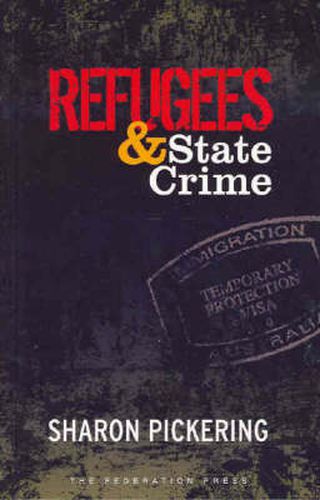Readings Newsletter
Become a Readings Member to make your shopping experience even easier.
Sign in or sign up for free!
You’re not far away from qualifying for FREE standard shipping within Australia
You’ve qualified for FREE standard shipping within Australia
The cart is loading…






In the aftermath of World War II, in the shadow of the Holocaust, the countries of the world signed on for a Convention giving rights and safeguards to refugees. Forced migration was a humanitarian not a criminal concern. Being a refugee involved discussion of human rights and protection rather than developing processes of criminalization and law enforcement.
Sharon Pickering documents how this has changed. Refugees and asylum seekers are dressed in the clothes of criminals, and national sovereignty has become the focus of the response of the Global North to forced migration.
Pickering adopts a State Crime framework, emerging out of a critique of law and order refugee politics, to explain policy responses. The roles of the administration, the justice system and the media are analysed to highlight the discourses of criminality which have come to dominate discussion of refugee and asylum issues.
She shows how the spectacle of the refugee as criminal allied to the rise of transnational policing, has led to the opening up of extra-territorial, extra-legal spaces, how contradictions have emerged as to national borders and how the rule of law has been debased.
$9.00 standard shipping within Australia
FREE standard shipping within Australia for orders over $100.00
Express & International shipping calculated at checkout
In the aftermath of World War II, in the shadow of the Holocaust, the countries of the world signed on for a Convention giving rights and safeguards to refugees. Forced migration was a humanitarian not a criminal concern. Being a refugee involved discussion of human rights and protection rather than developing processes of criminalization and law enforcement.
Sharon Pickering documents how this has changed. Refugees and asylum seekers are dressed in the clothes of criminals, and national sovereignty has become the focus of the response of the Global North to forced migration.
Pickering adopts a State Crime framework, emerging out of a critique of law and order refugee politics, to explain policy responses. The roles of the administration, the justice system and the media are analysed to highlight the discourses of criminality which have come to dominate discussion of refugee and asylum issues.
She shows how the spectacle of the refugee as criminal allied to the rise of transnational policing, has led to the opening up of extra-territorial, extra-legal spaces, how contradictions have emerged as to national borders and how the rule of law has been debased.